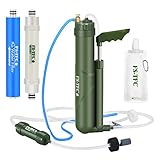Why Should I Store Water?
There is no argument among the prepping community that long term water storage is the most important prep you can have. And, you want to have a lot of it.
In our area, I see weekly boil orders especially as the weather gets colder. There is also the chance that the water may become contaminated like the January 9, 2014 Elk River chemical spill. Crude 4-methylcyclohexanemethanol (MCHM) was released from a Freedom Industries facility into the Elk River, a tributary of the Kanawha River, in Charleston in the U.S. state of West Virginia.
Many residents were caught off guard and rushed to local stores for bottled water only to find empty shelves. You don’t have to be one of them. Just by simply storing a few weeks of water, you can have peace of mind that you won’t get caught up in the hysteria.
How Much Water Should I Store?
There are several ways to store water for an emergency from simply purchasing bottled water from the store to installing an underground cistern. For the purposes of this article, I am going to focus on water storage options for a family of four for up to a month.
Before you start gathering supplies for water storage, double-check and make sure you have the structural stability and space to store your water in the containers of your choice.
The standard thinking is that you will need one gallon of water per person per day. If we go by that standard, you can see how fast the amount of water you will need for a family of four for a month can add up.
1 Gallon of water X 4 People X 30 Days = 120 Gallons of Water
If we visualize 120 milk jug sized containers full of water, we can see that we are talking about a lot of weight and a lot of space. So, how do we store that amount of water? Any way we can.
Large Water Storage Container Options
If you have the space and don’t need to move the containers that hold your water, 55 gallon food grade barrels are a great choice. You would need three of these barrels to hold the amount of water needed. Barrels are a simple but bulky and heavy so special consideration must be applied to their location.
For those with a basement, this would be the optimal place for your water storage. Basements can hold the weight and usually have the room needed to store. It will also be a more constant temperature to further lengthen the life of the water. For this reason, I do not recommend the garage as a storage area for water. Temperature swings and other contaminants are a possibility here.
Medium Water Storage Container Options
If you don’t have the space or structure to safely store the amount of weight three barrels of water will have, I suggest the 3-7 gallon food grade, BPA free storage containers available at your hardware store or local department stores. These containers are easier to store and easier on the back.
Storage options such as the Reliance Aqua-Tainer 7 Gallon Water Container is a great option for this application. To reach our goal, you would still need 17-19 of these containers. Another popular option is the 3.5 gallon WaterBrick Containers. These containers don’t hold as much water but are far more manageable than the Aqua-Tainers.
Small Water Storage Container Options
Your options for small container storage could simply be store-bought water in single-serve bottles. But keep in mind, the average size of these bottles, when bought in bulk, is around 16 oz. That would mean for a family of four for a month, you would need 960 bottles. That does sound like a lot of bottles but the upside to this method is that they can be stored in just about any nook or cranny.
Mis-Match Water Storage Container Options
If you are on a budget and don’t have the funds for store-bought water storage options, you can always reuse old containers such as two-liter soda bottles. Make sure you clean them well a keep them in a cool dry place to keep any unwanted alga or mold to a minimum.
I do not recommend that you store your water in store-bought milk jugs. They tend to break down quicker than thicker containers and will likely leak.
Alternative Water Storage Container Ideas
There are a few storage options that many forget about. One is your hot water heater. Your hot water heater can hold seven gallons of water and usually has a spicket at the bottom that will allow you to drain it in an emergency.
The other option is a WaterBOB Bathtub Emergency Water Storage Container. The waterBOB is a water containment system that holds up to 100 gallons of fresh drinking water in any standard bathtub in the event of an emergency. This option is great for short-term emergencies or when a probability that the loss of water may be imminent.
Things to Consider with Long Term Water Storage
Remember when storing water, you need a storage place that can handle the weight. Water is heavy. You also want to make sure that you store your water in a place that will not get damaged should your stores begin to leak. Moreover, if you feel iffy at all about the water you are about to drink, it is always a safe bet to filter it as needed.
Although this may seem like an unattainable goal, you don’t need to get it all together overnight. Add a little to your store at a time and be sure to rotate through the water as you need it. If you find water that has been stored in a questionable environment, use it to water plants.
























